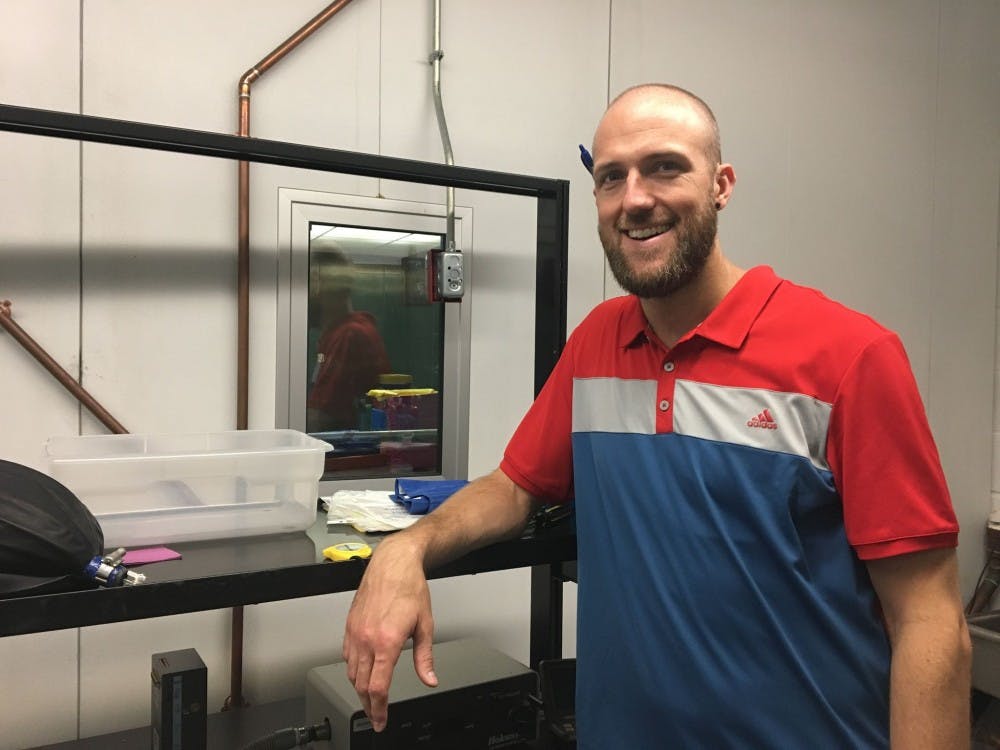From 2002-06, Dr. Zachary Schlader controlled the post as a power forward for the Austin Peay State University Governors basketball team. But there was an off-the-court problem.
Schlader’s class schedule conflicted with hoops. As a biology major, he needed to take chemistry and biology labs, but practice got in the way.
That’s when Schlader combined the two and switched to what would later become his profession: health and exercise sciences.
“When I had to make a decision between labs and basketball practice, I went along and went with health, knowing that exercise physiology would be kind of cool,” Schlader said. “I thought to combine my interests in athletics with my science interests, and both were paired up in exercise physiology.”
Schlader is an assistant professor in the department of exercise and nutrition sciences. Despite leaving behind his basketball career, Schlader’s world travels have led him to Buffalo, where he researches the connection between human behavior and thermodynamics.
After graduate school at Indiana University, Schlader went halfway across the world for his Ph.D. at New Zealand’s Massey University. Schlader then completed a post-doctorate at the University of Texas Southwestern Medical Center before coming to UB in 2014.
One of Schlader’s studies involves participants exercising in an aquatic suit, as water perfuses through the suit.
Schlader said participants can choose to cool the suit whenever they want and his research involves looking at various bodily signals participants listen to that determine whether or not they decide to cool down.
“[Participants] can choose to cool that suit whenever they want and the idea is looking at what signals they’re listening to that help maintain comfort when exercising and [after] exercise,” said Schlader.
“We know that comfort is a key determinant of how people are … feeling [overall], whether they are satisfied with what they’re wearing, it can influence a lot of other things,” Schlader said. “So, we are trying to understand the signals that people are listening to that cause discomfort and ultimately, behavior.”
Schlader’s heat and exercise-related studies expand further, though. One study he is involved in is funded by the U.S. Navy and focuses on disabled submarines.
In the study, researchers simulate a disabled submarine situation using an immersion tank. Researchers then can examine how hot and dehydrated study participants get when trapped in a humid environment for a number of days.
“Essentially, we are exposing people to various temperatures for eight hours in 100 percent humidity environment –– it’s almost raining and there’s condensation everywhere,” Schlader said.
“We are just trying to see how hot and dehydrated they’re going to get, so the question is how much water do they need to keep onboard to keep people alive for up to four days. What’s the minimum amount of water [the submarine has] to carry so that everyone on board is going to be safe?”
In addition to his own work, Schlader is an investigator at UB’s Center for Research and Education in Special Environments.CRESE research looks to explore “the interaction of exercise and extreme environments to study basic and translational science relevant to human performance and survival,” according to CRESE’s website.
The center includes environmental chambers, hyper/hypobaric chambers and a human integrative physiology lab.
“It’s a pretty big group, between the three investigators we have,” Schlader said. “There are around six to ten big projects going at any time on top of ones that are more student-driven.”
Jessica Hichez, a senior biological sciences major, is completing a year’s worth of research as part of UB’s Biology Honors Program in Schalder’s lab.
“[Schlader] is very attentive and down to earth when it comes to those projects in the lab and the projects [researchers] are all working on,” Hichez said. “He gives [me] independence while also assuring us that if we have any problems or questions, he is always available whether it’s an email or an in-person meeting.”
Schlader said he believes in the importance of human interaction in the studies and just a number of years ago, said he used to try his studies on himself.
“It’s not mandatory, we don’t make ourselves go through it, but I think [wanting to be in the study you’re conducting] happens naturally,” Schlader said. “Part of it is I’m curious as well. I want to know what it feels like before I make someone else do it,” Schlader said.
Schlader said he greatly enjoys his work and believes going into research is a great idea. He likes that he is able to tell people that his job is to learn new things.
“I tell my kids that you’re not going to go to school forever, but you should always be learning. I don’t know what I would do if my focus wasn’t trying to learn something else or do something different every day.”
Now with research, a family and a busy schedule, Schlader said he doesn’t play much basketball anymore — though it was a defining point in his career.
“My wife and I have three young kids, so time is an important thing,” Schlader said. “I’d rather hang out with them than go out and play basketball. We do play a lot of lowered-hoop driveway basketball together though, so I feel I still have that.”
Kirsten Dean is the assistant features editor and can be reached at kirsten.dean@ubspectrum.com and on Twitter at @KirstenUBSpec.





